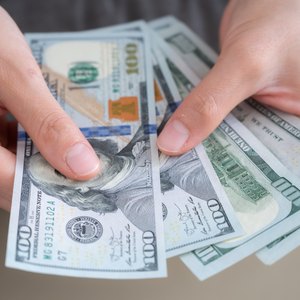
Cash is a time-honored method of payment, as it has a set value that users and vendors recognize easily. While credit cards, debit cards and digital payments are payment methods used more and more in recent years, paying with cash can help you save money. By avoiding interest rates, transaction fees and overdraft charges, the advantages of cash might just outweigh those of card payments. But as with anything in personal finance, it’s important to consider the pros and cons of using cash.
Cash Budgeting Advantages
The Consumer Financial Protection Bureau suggests you create a budget and use cash to stick to it. With cash, you can set aside money for each budget category using the envelope budgeting method and use only the amount of money that has been allotted for daily and monthly expenses.
If you underestimate or overspend, you’ll face the sobering exercise of robbing one of your budget envelopes to make up for the shortfall. Avoiding the feeling of failure can be a strong motivation for realistic spending.
Cash Cuts Your Spending
Other benefits of cash are that it helps you set spending limits, stay within your budget and save money. When you have a fixed amount of banknotes in your hand to spend, you are far less likely to pile the cart full of unnecessary impulse items.
When you use cash for shopping, you tend to disregard tantalizing specials and sales on things that aren’t in your spending plan. This also prevents you from dipping into your checking or savings accounts or using digital money you can’t afford to spend.
Cash Is Accepted Almost Everywhere
Almost all large and small businesses accept cash. This isn't always true with credit and debit cards. When you want to save money by shopping at your local flea market or a roadside produce stand, you're unlikely to be able to use plastic. Some of these events are cash-only.
In addition, if you use cash for your transactions instead of plastic, you might be able to haggle over the price and keep some of your cash in your wallet. Some small businesses even offer discounts to customers using cash because it saves them on transaction fees.
Cash Is an Anonymous and Secure Payment
Cash purchases are anonymous and don’t leave a paper trail. Plus, cash doesn't expose you to fraud. Swiping a debit or credit card at the register exposes your financial information, such as where you bank and sometimes where you live. Using cash keeps your personal information secure.
However, when you need to have proof of payment, the anonymity of a cash payment can be a drawback. Transactions made from a mobile wallet or credit card have an electronic record that you can point to whenever you need it.
Cash Is Fee- and Debt-Free
Unlike debit and credit cards, cash payments or withdrawals don’t have added fees tacked on. When you use cash, you don’t incur a debt that has to be paid at some date in the future. The Federal Trade Commission offers reminders of the fees that can come with credit card payments and ATM withdrawals.
The Psychology of Using Cash
The Massachusetts Institute of Technology (MIT) notes that studies show spending real cash is more emotionally painful than swiping a card. You see your funds being depleted with every transaction. As your wallet gets lighter, you'll focus more on what you’re buying and how much it’s worth. Even when you leave home with more than you need, using cash also helps you track your spending at once.
Cash Is Critical For Emergencies
For natural disasters and other emergencies, using cash is often the only way to buy what you need to survive. Stores can’t check and validate debit and credit card transactions when they don’t have power. Keep cash on hand for buying gas to travel to a safer place, paying for temporary lodgings and buying provisions like ice and water.
References
Writer Bio
This article was written by PocketSense staff. If you have any questions, please reach out to us on our contact us page.
